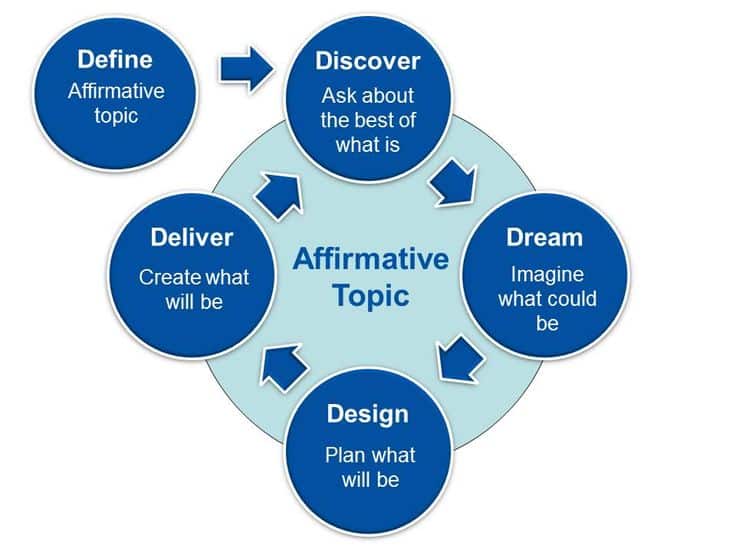Table of Contents
Appreciative inquiry (AI) is a psychological approach that some businesses use to encourage positive change. If they want a better company culture, they can utilize appreciative inquiry to accomplish the goal. Likewise, if they want to improve customer satisfaction with the brand, they can use appreciative inquiry to create an effective action plan to accomplish that objective. Appreciative inquiry isn’t only for businesses either. It has been used in sports and in personal lives for triggering positive change. Below we will explain what AI is and provide helpful tips for applying it in sports.
Note that this article isn’t a definitive resource on appreciative inquiry. For serious problems, it’s best to consult a professional. It’s also a good idea to continue learning more about AI before implementing it to ensure its success.
*This post may contain affiliate links. As an Amazon Associate we earn from qualifying purchases.
What Is Appreciative Inquiry?
Appreciative inquiry is an approach to change management involving identifying what’s working and why it’s working. Then, the individual does more of what’s working well. This approach is based on the belief that an organization (or in sports, a team) grows wherever the people of the organization (or the team players) focus.

Part of appreciative inquiry’s process involves asking guided questions that support employee interaction with each other and positive thinking. Each question must focus on one of four areas: discover, dream, design, and deliver. The four key areas are also referred to as the 4-D Model.
6 Tips for Appreciative Inquiry
1. The way one asks questions determines what they find
This is why questions are framed positively with this approach. One has more to gain from positive questions than negative. According to the simultaneity principle in appreciative inquiry, inquiry and change are simultaneous. A small change occurs when one asks someone a question.
2. It’s important to feel positive in order to take positive action
This is another principle of AI. Feeling positive emotions strengthens one’s sense of wellbeing and increases their energy. It empowers them to nurture relationships. Positive feelings cause a person to be more receptive to new ideas from others. One’s attention and thinking also expand momentarily. Ways in which one can feel positive is to think positively, watch inspiring movies, and talk about positive things. Cutting back on discussing celebrity drama and other negative news is also helpful.
3. Remember the importance of camaraderie in sports

However, some coaches forget the importance of camaraderie or don’t understand why it’s beneficial. The positive principle in appreciative inquiry explains that social bonding and positive affect must occur for momentum and sustainable change. Coaches that ignore camaraderie will notice change doesn’t last when applying AI.
Positive sentiments increase cognitive flexibility, creativity, and openness to new ideas. Why is creativity important in sports? Creativity in making a goal can make the difference between winning and losing. Finding an unexpected route to landing a goal takes the other team by surprise. Examples of positive sentiments include camaraderie, hope, joy, excitement, and inspiration. Aim to create these feelings in players during their bonding time. This principle is also effective in teams in which players have conflict among each other because it improves their relations.
4. Coaches must be selective about what they choose to believe
According to the constructionist principle, what a person believes to be true determines what they do. It also states that communication and conversation are at the core of change and organization. Also know that poor communication skills can interfere with the effectiveness of AI. As people communicate, they seek meaning together. Assuming the communication is constructive, the right ingredients are in place for taking positive action. You can’t just take any action. One wants everyone involved to take action toward accomplishing the goal and bringing about the envisioned change.
5. Start telling better stories to the team
The poetic principle of AI states that the stories people tell each other every day shape organizational life. A coach can’t completely control the stories team members tell each other. But the coach has control over the stories they tell the team. As a leader, the coach must guide players to sharing their own inspiring stories with their own. After falling into the routine of sharing motivating stories with the team, the players will pick up on the behavior. The words and topics that one chooses for the stories have an impact. Put thought into what’s shared and how it’s expressed in order to spark positive change.
6. Create a vision with the team
The best companies have an inspiring vision. Having a vision statement isn’t something limited to business, however. Vision statements are helpful in personal life and in sports as well. Many successful sports teams not only have a vision but the players understand and work toward the same vision as the coaches. While asking the players appreciative inquiry questions, the coach should ask questions that help shape a vision.
Once the team has agreed on an inspiring vision of where they want to be, reinforce it through words and visuals. A coach can hang up placards that represent the vision to keep in on the minds of their players. This tip comes from the anticipatory principle of appreciative inquiry. What a person does today is guided by their image of the future. This is why having the right vision is important. People must ask themselves what they want their lives to look like in five years. Then, work toward that vision until it becomes reality. If it has been achieved, a new vision must be created in order to keep growing and working toward something better.
Conclusion
Appreciative inquiry is one of the most effective approaches to use not only in business but sports. Focusing on everything that’s wrong only continues attracting problems and errors. It causes the players to feel negatively, in turn negatively impacting their performance. Taking a more positive approach to coaching such as utilizing appreciative inquiry improves players’ performance.
This approach involves asking the players key questions framed positively to encourage positive change for the entire team. When everyone is involved in the process, the team is more willing to take action toward positive change. As long as you correctly implement the principles of appreciative inquiry, change lasts as well.
Are you excited to try appreciative inquiry on your athletes? Have any questions? Let us know in the comments below.
